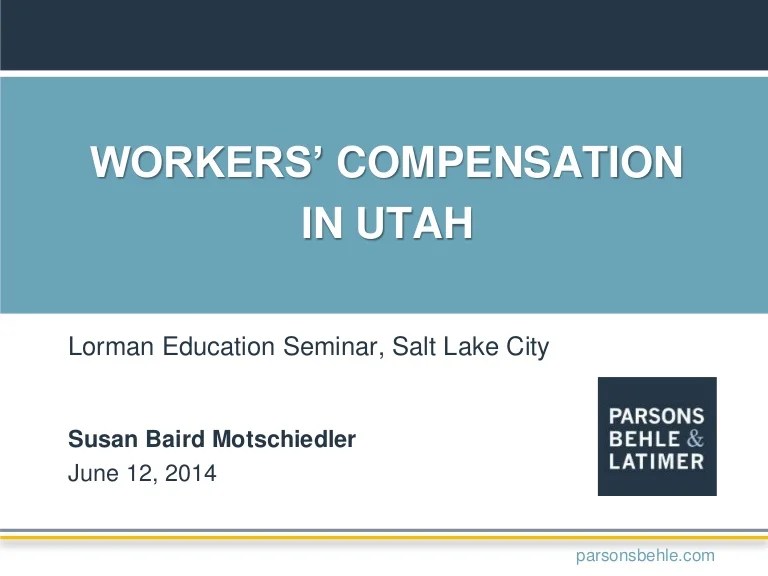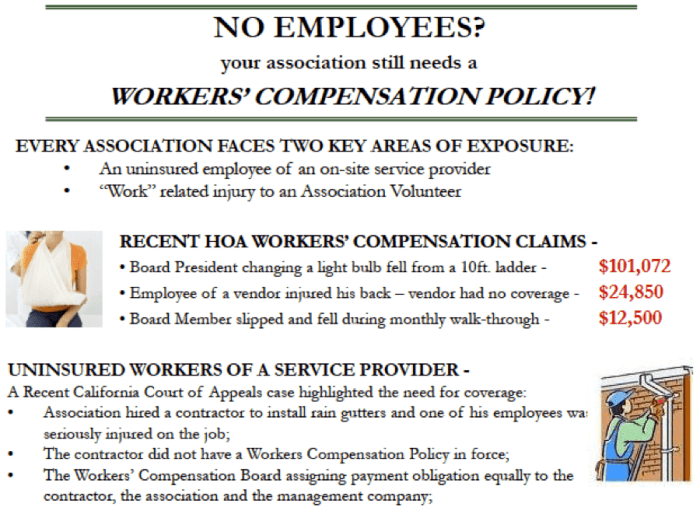Utah workers compensation insurance – Utah workers’ compensation insurance protects employees injured on the job. Understanding your rights and responsibilities is crucial. This guide provides essential information about coverage, benefits, and procedures in Utah.

Source: slidesharecdn.com
Navigating the intricacies of workers’ compensation can be daunting. This resource simplifies the process by offering clear explanations and actionable insights.
Utah workers’ compensation insurance is a crucial aspect of workplace safety and financial security for both employers and employees. This comprehensive guide dives deep into the specifics of this insurance, exploring its intricacies, benefits, and implications. We’ll cover everything from eligibility requirements to claim processes, helping you understand your rights and responsibilities within the Utah system.
Understanding Utah Workers’ Compensation: Utah Workers Compensation Insurance
Utah’s workers’ compensation system is designed to provide financial assistance to employees who suffer work-related injuries or illnesses. This system is distinct from general liability insurance, focusing solely on workplace incidents. The goal is to ensure injured workers receive necessary medical care and financial support while they recover, minimizing disruption to their lives and careers. This system aims to encourage employers to maintain safe workplaces, promoting overall workplace well-being.
Eligibility for Benefits
To be eligible for workers’ compensation benefits in Utah, the injury or illness must be work-related. This often involves demonstrating a direct causal link between the work environment and the injury or illness. Examples include injuries sustained during job tasks, illnesses contracted due to workplace exposure, and occupational diseases. Specific criteria and documentation requirements are crucial to establishing eligibility.

Source: slideserve.com
This process often involves medical evaluations, accident reports, and witness statements.
Types of Benefits Available
Utah’s workers’ compensation system offers various benefits, including:
- Medical Benefits: Covering the costs of necessary medical treatment for the injury or illness.
- Temporary Disability Benefits: Providing financial support for lost wages during the recovery period.
- Permanent Disability Benefits: Offering financial assistance if the injury results in permanent impairments.
- Death Benefits: Providing financial support to dependents in the event of a work-related fatality.
Employer Responsibilities and Obligations
Utah employers have a legal obligation to provide workers’ compensation insurance to their employees. Failure to do so can result in significant penalties. Understanding the specific requirements, such as the types of coverage, premiums, and reporting procedures, is vital for employers to avoid legal issues.
Reporting Requirements and Procedures
Employers in Utah are required to report work-related injuries and illnesses promptly. Proper reporting is crucial to initiate the claim process and ensure timely access to benefits. Procedures for reporting accidents and injuries vary, and understanding these guidelines is paramount to maintaining compliance.
Employee Rights and Responsibilities
Employees in Utah have rights regarding workers’ compensation claims. They have the right to receive prompt medical attention and financial assistance. Understanding the reporting procedures, claim filing processes, and their rights is essential for workers seeking compensation.
Filing a Claim and the Process, Utah workers compensation insurance
Employees in Utah can file a claim with the Utah Division of Workers’ Compensation. This process typically involves completing forms, providing supporting documentation, and attending hearings if necessary. Knowing the steps involved in filing a claim, the timeline for processing claims, and potential appeals processes is crucial for employees.
Frequently Asked Questions (FAQ)
- Q: What if I’m injured on the job but don’t know if it’s work-related?
A: Consult with a medical professional and report the incident to your employer as soon as possible. Documentation is key to establishing causality.
- Q: How long does the claim process take?
A: Processing times vary depending on the complexity of the claim and available evidence. The Division of Workers’ Compensation will provide updates and timelines.
- Q: What if I disagree with the decision of the Division of Workers’ Compensation?
A: You have the right to appeal the decision, following established procedures and deadlines.
- Q: Can I get legal help with my workers’ compensation claim?
A: Yes, consulting with an attorney specializing in workers’ compensation can significantly benefit you throughout the process.
Conclusion and Call to Action
Navigating the Utah workers’ compensation system can be complex. This guide provides a foundation for understanding the key aspects of this crucial insurance. Always consult with relevant authorities and professionals for specific advice tailored to your situation. For further information, you can visit the Utah Division of Workers’ Compensation website. By understanding your rights and responsibilities, you can ensure a smoother process if you or someone you know is involved in a work-related injury or illness.
Contact the Utah Division of Workers’ Compensation for specific inquiries and assistance.
Disclaimer: This information is for general knowledge and informational purposes only, and does not constitute legal advice. Consult with legal professionals for personalized guidance.
In conclusion, Utah workers’ compensation insurance is a vital safety net for employees. By understanding the nuances of the system, workers can effectively utilize benefits and resources to recover and rebuild their lives after an injury. This guide serves as a starting point, but consulting with legal professionals is always recommended for personalized advice.
Q&A
What are the common causes of workplace injuries in Utah?
Common causes include slips, trips, and falls; machinery accidents; and exposure to hazardous materials. Specific industry-related hazards also contribute to workplace injuries.
How long does the claim process typically take?
The timeframe for claims varies significantly depending on the complexity of the injury and the specific circumstances. It’s advisable to contact the relevant authorities for precise timelines.
What types of medical expenses are covered?
Generally, covered medical expenses include doctor visits, hospitalizations, therapy, and necessary medical equipment. Specific details depend on the plan and the nature of the injury.
What if I’m not satisfied with the initial claim decision?

Source: balsigerinsurance.com
Workers have avenues for appealing a claim decision. The appeals process typically involves following prescribed procedures and possibly seeking legal counsel.
